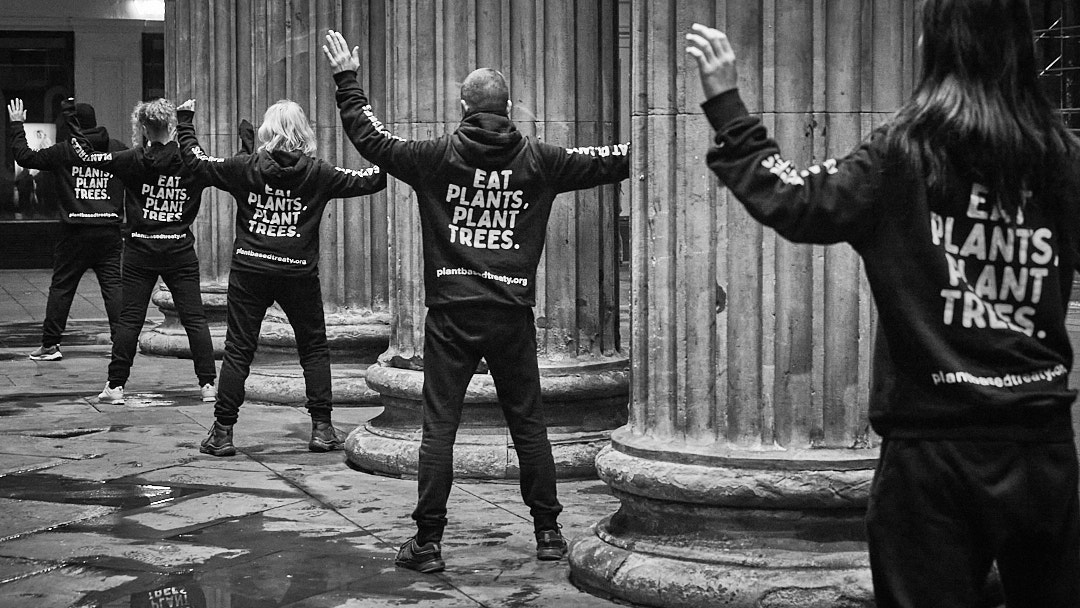Edinburgh becomes the first capital city in Europe to endorse the call for a Plant Based Treaty in response to the climate emergency.
Edinburgh report states “Meat and dairy consumption must reduce to achieve climate targets” as the council writes to the First Minister inviting Scotland to enter into a Plant Based Treaty
The City of Edinburgh Council has endorsed the Plant Based Treaty, becoming the first Scottish city and first capital in Europe to join the initiative to tackle food-related emissions from animal agriculture and attributed deforestation, a key driver of the climate emergency. The proposed treaty is backed by 20 municipal governments worldwide, including Los Angeles and Haywards Heath.
Endorsing the Plant Based Treaty is non-binding and carries no legal risk. The council would be expressing support for a treaty to be negotiated at a global level as a companion to the Paris Agreement on climateB
Green Councillor Steve Burgess, first introduced the Plant Based Treaty to a Full Council Meeting in March 2022, where councillors unanimously voted to produce an impact assessment on the implications of endorsing the Plant Based Treaty. Burgess said:
Edinburgh council itself now also has a fantastic opportunity to encourage far more plant-based eating and I look forward to the forthcoming council report on how we can do that.
By declaring our endorsement, we are acknowledging that food systems are a main driver of the climate emergency and that a shift towards plant-based diets can go a huge way in reducing greenhouse gas emissions. Plant-rich diets are also a ‘win-win-win’ for society: they have a lower environmental impact, significant health benefits, and reduce animal welfare impacts.”
The Treaty aims to halt the widespread degradation of critical ecosystems worldwide
caused by animal agriculture, to promote a shift to more healthy, sustainable plant-
based diets and to actively reverse damage done to planetary functions, ecosystem services and biodiversity.
The Treaty has three core principles:
- Relinquish: no land use change, ecosystem degradation or deforestation for
conventional animal agriculture - Redirect: an active transition away from animal-based food systems to plant-based
systems - Restore: actively restore key ecosystems, particularly restoring forests and
rewilding landscapes
- Relinquish: no land use change, ecosystem degradation or deforestation for
The report acknowledges “diets high in plant protein and low in meat and dairy make for lower greenhouse gas emissions, and that consequently, shifting consumption towards plant-based diets has a major mitigation potential,” and states, “Overall, the science is clear, meat and dairy consumption must reduce to achieve climate targets.”
The report shows food and diet account for 23% of Edinburgh’s consumption-based footprint with 12% of these emissions from the consumption of meat. The report states, “a shift to plant-based diets would therefore significantly reduce the city’s consumption-based emissions.” The report’s findings have been echoed loudly elsewhere, too. A 2019 report from the C40 network cited food as the biggest source of urban consumption-based emissions and noted that a move to a plant-based diet offers, by far, the biggest opportunity for emissions savings in cities.
We spoke with Nicola Harris at the Plant Based Treaty.
Will the Plant Based Treaty incorporate education to the citizens of Edinburgh?
Following Edinburgh’s endorsement of the Plant Based Treaty, we hope to see plant-based accessibility increase across the city as well as public education to help residents make sustainable food choices. Councils have played a key role in educating the public about recycling and food waste, and now it’s time to tackle emissions from the food system. Edinburgh discovered that half of the consumption-based food emissions in the city come from meat consumption. Therefore, plant-based diets offer a huge opportunity to respond to the climate emergency with the huge cuts required this decade to prevent climate breakdown.
Are Scots given tax credits or any sort of monetary incentives to make the changes necessary?
N/A – UK Gov only give tax credits to parents of children and those on low incomes. Tax credits are not issued in the UK to change behaviours.
Will this make larger meat producers in the region more apt to offer sustainable cultivation?
A global Plant Based Treaty would support farmers in transitioning to sustainable, regenerative plant-based farming practices and see regions unsuitable for crops rewilded to draw carbon from the atmosphere and restore biodiversity. A shift to plant-based diets would reduce land use by 75%.
How can Scotland make this a far more international inspiration for nations looking to take their climate responsibility more seriously?
Scottish cities endorsing the Plant Based Treaty will help pressure the Scottish and UK Parliaments to begin negotiations for a global treaty to address the enormous impact of our food. Even if fossil fuel production ended today, food emissions alone would take us above and beyond 1.5C warming. A shift to plant-based diets can reduce an individual’s carbon footprint from food by up to 73 per cent. If we are serious about preventing catastrophic climate collapse, plant-based food solutions and policy change must be at the heart of the climate emergency response.
- Endorsement of the Plant Based Treaty
- Requesting that the Council Leader writes to the First Minister and relevant Cabinet Secretary / Ministers outlining that the Council has endorsed the Treaty, and encouraging the Scottish Government to do so too
- Requesting an action plan and timescale for implementing possible changes to Council activities following the endorsement of the treaty
Green councillors very much welcome the decision by Edinburgh council to endorse the Plant Based Treaty as we proposed. Edinburgh council’s leader will now be writing to the First Minister of Scotland to encourage the Scottish Government to also express support for a Plant Based Treaty to be negotiated at a global level.
Nicola Harris, communications director at Plant Based Treaty said, “Edinburgh has lived up to its reputation as a global climate leader by acknowledging the critical need to reduce greenhouse gas emissions from the food system to achieve our climate targets. Promoting plant-based food across Edinburgh will help residents make informed choices that are better for the planet, personal health and animal protection.”











